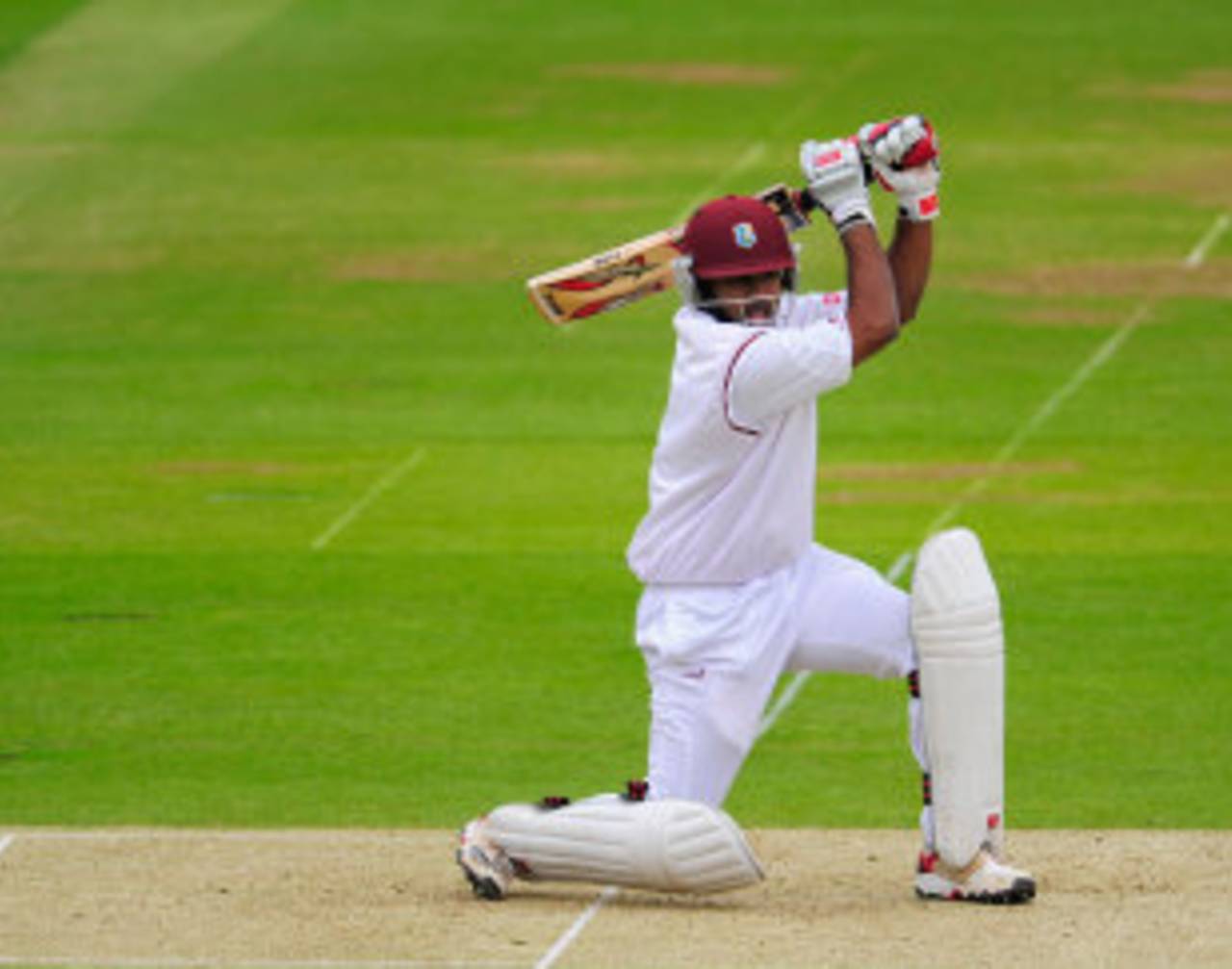History against young West Indies openers
They are facing one of the best bowling attacks in the world, but the visiting openers need to give their middle order a better start
Nagraj Gollapudi at Trent Bridge
24-May-2012

Adrian Barath impressed in the first innings but must build on his starts • Getty Images
When Adrian Barath and Kieran Powell, West Indies' first-wicket pair, walk out at Trent Bridge they will be up against history. A strong opening partnership, more times than not, has been a vital characteristic of the domineering Test teams in any era but across eight Tests and 15 innings at this venue there has only been one century opening stand for West Indies. That partnership, shared between Allan Rae and Jeffrey Stollmeyer, came in their maiden Test in Nottingham in 1950, a match West Indies won by 10 wickets.
Last week at Lord's the Barath-Powell combination produced efforts of 13 and 36. Both men are 22 years old, with Powell older by 39 days; they have an aggregate of 731 Test runs between them with a solitary century - Barath's debut ton against Australia in 2009. Since 2005, Trent Bridge has had one of the lowest averages (for a ground with minimum of 10 Tests) for the first wicket of 29.82. It is a tough place to open the batting.
To add to that, since 2008 only New Zealand have a lower average for opening stands than West Indies. Remove Chris Gayle and their figure of 28.83 slides down to 22.32. But West Indies are getting used to low expectations of their performances. They are also getting used to a life without Gayle. At Lord's, despite the defeat, in addition to stretching the match to the fifth day, West Indies also scored 588 runs. Few expected that to happen.
Though the pair of Barath and Powell did not have much say in terms of numbers, their second-innings effort to stay stubborn for an hour was progress in the right direction and something the West Indies batting coach Toby Radford can be happy about.
According to Radford, a former the head coach at Middlesex who has also worked for England's national academy at Loughborough, the challenge for the young batting order, and in particular the openers, is consistency. Like taking a mallet to a new bat, Radford has been knocking into their minds the need to play late against the swinging ball, leave more balls and play closer to the pitch of the ball. "It is important to either go forward or back and not getting stuck on the crease," he picked out as the keys to batting in England.
Playing the ball, not the bowler, is also in the mantra of many successful batsmen. However, that only comes with over experience. The raw West Indies' top order has come in for heavy criticism chiefly because not many of them have shown the ability to apply themselves for longer periods.
Take the example of Barath at Lord's. His first-innings 42 was the ideal base to make a substantial score. Yet he slipped back into committing familiar mistakes. "From Barath's point of view he knew he was playing well, and he is playing well," Radford said. "He had survived two hours in the morning and seen off the new ball, done part of the job, come in for lunch and then after lunch chased a ball, which at 10 past 11 probably he would have left.
"The frustration on his and our part was he did not go on - turn his 40 into 140. It was a slack shot and loss of concentration."
Powell, who was beaten by a superb inswinger from James Anderson on the first morning, was then sucked into a short delivery form Stuart Broad in the second innings and went immediately for the hook despite knowing the square leg had been pushed back the previous delivery.
Radford has been working hard on Barath keeping his weight balanced when he is playing his shots. As for Powell it has been a lesson in what to play and what to leave; training the mind not to play deliveries swinging away from him. Radford, though, does not believe the batsmen can use youthfulness as an excuse and wants them to learn from their opposite numbers.
"I don't want players look for excuses like they are young," he said. "They are here based on their merit. They are here because they are quality players. Last week Andrew Strauss got a big score when Alastair Cook did not. And in the second innings when Strauss went early, Cook stood there. In both innings one of the openers got a score; someone stayed and batted for a long time.
"The key for us is one of our guys doing that in each innings or even both. But certainly you need someone who can protect the middle-order for longer. You don't want the middle-order to come and face a new ball swinging and bouncing hard. You want them to come with the scoreboard reading 150-200 runs on the board and adding to that score. That is the job of the openers."
On Thursday afternoon, the first thing Darren Sammy told his team-mates during the team huddle was about how Trent Bridge has always been good hunting ground for West Indies. They have never lost a Test here. It is a rare piece of history currently in the visitors' favour. For them to have a realistic chance of continuing that legacy, West Indies' young batsmen need to play their part.
Nagraj Gollapudi is an assistant editor at ESPNcricinfo